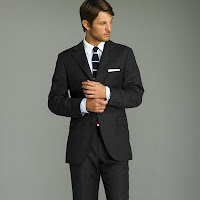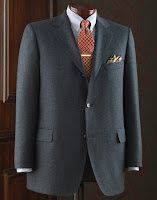 A reader recently contacted me because as a newly graduated attorney, he wanted some specific advice on what to look for in a suit. He also wanted to hear about a few specific brands.
A reader recently contacted me because as a newly graduated attorney, he wanted some specific advice on what to look for in a suit. He also wanted to hear about a few specific brands.
The gentleman indicated that he is based in Chicago and his work environment is a more formal one. That is, he is not asking about those two or three times when he needs to pull out a good suit. Rather, he needs to be dressed for business most of the time if not all of the time.
As this young man is starting out on his career, I have decided to focus on a couple of classic and readily available brands. While bespoke and made-to-measure are the favorite topics of the armchair cognoscenti, in reality, this fellow is looking for practical advice on building a realistic, starter suit wardrobe. So, do I like Oxford? Yes. Will we discuss Oxxford right now? No.
Generally speaking, when it comes to tailored clothing like suits, you get what you pay for. I can attest to this through personal experience as I suspect many others can too. A suit for $199 will be serviceable at best, have a lower grade of fabric, fused seams and a boxy fit. For some guys, that’s OK; they don’t need the finer details, they just need a suit for occasional wear. I am certainly not going to pick on these men because for them wearing a suit is a necessity to be suffered through. Who am I to judge? My only comment is the perennial argument that you should treat clothing as an investment and buy the best quality you can afford. Over time, value tends to outlast fast fashion or convenience.
In my reader’s case, he is looking for details and quality within an affordable range. So, my first point is that there are many suit makers who produce very good clothing and a few that are excellent. My second point is that the focus should always be on what makes a good suit more than who makes it. So, right off the bat I’m contradicting myself, but I’m doing so for expediency’s sake.
The Classic Suit Makers
To see what’s out there, let’s now highlight some of the better known traditional American makers and what they bring to the table. For good suits that will carry you through most business or legal situations, you cannot go wrong with Brooks Brothers or J. Press. Of late, Brooks has expanded its styling to reflect a more global aesthetic that is in line with its Italian CEO: tapered darting, leaner lines, higher armholes and double vents. But even with these refined touches, Brooks’ suits are still very much a first line resource.

Brooks Brothers Fitzgerald suit
J. Press on the other hand is about as traditional American classic as you can get. The suits one can pick up at a Press store today basically look like the ones in my father’s closet from 25 years ago – accounting for slight variations for lapel width and button stance.
Joseph A. Bank is a national middle market name that carries good suits. Back when I was a youngster and Banks was an East Coast local (it’s headquartered in Maryland), the company was known as the poor man’s Brooks Brothers. My first suit was a dark grey chalk stripe in a medium weight flannel. I loved that suit – no idea what happened to it. The company’s Signature line uses better fabrics and detailing, but for workday suits, the regular Executive line is quite good.
Polo/Ralph Lauren suits are, as a whole, of excellent quality and some of the nicest off-the-rack suits you’ll find. They are also ridiculously overpriced. Most of Ralph Lauren’s suits are manufactured in Italy by a variety of excellent companies and will likely last a lifetime. Ralph Lauren is a company that long ago mastered multi-brand niche marketing and emotional retailing. It has product lines that touch all over the pricing spectrum, even with its suiting. The core line of Blue Label suits includes the aforementioned Polo/Ralph Lauren line as well as the Ralph Lauren line. Black Label hearkens back to slimmer mod design influences. The bespoke level Purple Label line is something to check out when you make partner.
If your budget is already at the Purple Label level, head directly to Paul Stuart, the very definition of exacting quality at exorbitant prices. Paul Stewart clothing has a certain earthy anglophile feel, but make no mistake, it is unambiguously traditional classic American. Very Manhattan CEO – though right now that isn’t saying much.

Timeless style from Paul Stuart
Outlet Shopping
Many people, me included have turned outlet shopping into a blood sport, so let me comment on this often fruitful alternative to retail. Both Brooks Brothers and Ralph Lauren have factory outlet stores all over the place. While outlets used to be the place where overstocked items and factory seconds reigned, today most companies manufacture clothing specifically for their outlets.
So beware; if you are looking for quality than avoid the “Lauren” and “Chaps” lines at Ralph Lauren outlets and “346” at Brooks outlets. They are not bad clothing per se, but they are of decidedly inferior quality and workmanship. Instead, be on the lookout for retail store clothing that has been moved to the outlet store.
Dedicated outlet stores can harbor good deals, but you need to pounce when they arise. I recently found an exceptional cashmere blend Ralph Lauren odd jacket at a Polo outlet. It was regularly $1,500, and I snagged it for $199. The deals are there if you keep an eye out. I am reminded of a favorite saying of my father: chance favors the prepared mind.
To that point, not too long ago I discovered a $1,700 Canali suit for $399 at Filene’s Basement. Canali is an excellent Italian brand that happens to fit me quite well. There was one 44 regular and I grabbed it. The suit then went to my own tailor for adjustments.
I cannot stress enough that when you buy a suit, I don’t care where it comes from, take it to a tailor to be properly fitted to your body. This is nonnegotiable. If the store has a good tailor on staff, fine; otherwise find and a good tailor on whom you can rely. The most expensive suit in the world will look bad on you if improperly fitted.
They Make Suits?
Let me comment on fashion brand suits. While companies like J.Crew, Tommy Hilfinger, Banana Republic, or H+M are wonderful resources for casual clothing and sportswear, I do not recommend them for suits.
First, it’s just not their thing. They are not tailors or craftsmen, they are casual wear retailers whose primary goal is to move seasonal inventory. That’s not an admonishment, just a fact.
Suit from J.Crew: nice style but average quality at best
Second, clothing with a capital “C” requires at the minimum staff who understand the difference between tailored clothing and a stack of pre-sized khakis. Just as I would never send someone to Brooks Brothers for a great pair of jeans, I would not send my readers to J. Crew for a high quality suit. Yes, it may be passable for that first “out of college and I’m too young for J. Press” suit, but for the money you’ll spend it’s not worth the expense.
My issue with casual clothing companies which make suits is not so much that they “should” not make business clothing, suits in particular, but that what they make is often of poorer quality and limited detail. If someone is looking to invest in one good suit, it makes sense to focus their attention to clothiers that are known for making quality product. That said, I absolutely agree that if a suit fits and you like it, than it’s a great suit.
As I said previously, I have no room to pass judgment on such an issue. My goal here is to provide a solid but broad starting point for someone looking to upgrade his business wardrobe.
A Final Thought
Lastly, make sure your suit suits you. It should feel right when you put it on and comfortable throughout the day. You should look and feel natural in your own suit and building that kind of rapport is not always quick. Sometimes it takes a while to find a suit maker whose general shape best fits yours. Not everyone is a suit person and that’s fine by me. I’m not a suit person every day of the week either, but on those days when I am one, my suits feel and look great.
And so should yours.

